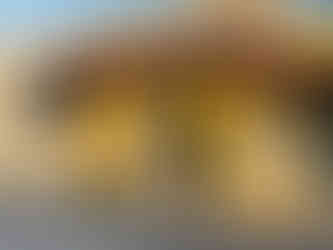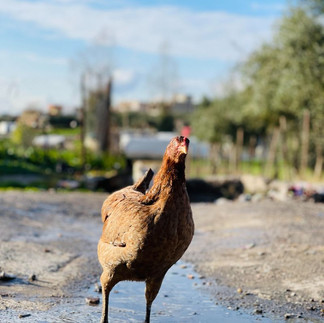My Village
- Nov 8, 2021
- 6 min read

I am often asked about Shariya village itself, about its history, its culture and flavor. Pertinent questions, ones which provide the context and backdrop to our life and work. Today we will share something about our unique and quite quirky village.
It has remained unique in its atmosphere, different in its character, there is no other Yezidi village quite like Shariya. During the period of requesting land for Springs of Hope, Dr Saeed and I were taken by Erbil Government officials to various villages to see land available, Shexan, Khanke, to name a couple. No discussion was needed, we both sensed the atmosphere of the villages and regardless of the size or situation of the land, hit the reject button. We knew where home should be. We rejected land even when there was no offer in Shariya.
This week I have asked Sahla and some of my team to share a few words about the village where they were born and doubtless will marry and raise their families, and generations to come.

Sahla:
“It’s my home. I was born in the new village. Since the period of Sadam Hussein who systematically destroyed the seven surrounding villages, where our families fought as Peshmerga against the Baath regime it has been known as Shariya Complex. The complex is composed of seven villages, Shariya of course, plus Sina, Gerepany, Shexidry, Kalibadry, Kharshanya, and Rekava. After he had bombed the villages three times but not wiped us out, he decided to collect all our families together in one complex so that it would be easier for him logistically to take us all out. The complex was then known as Abu Firas’s al Hamdani complex. He was an Islamic leader and fighter, born in Mosul. In 1991 the name of the village was changed to Shariya.
"Between 1991-2003 life and nature of Shariya changed. Our life in the old village was agricultural, working on farms and with the sheep. The refugees who fled Sinjar now live in our old homes which most of us have slowly rebuilt. They provide the continuum of sheep farming and agriculture. We allow them to live, and they farm.



"When the complex was built, and our proximity to the city of Duhok decreased, we connected with the academic world of the city. The University of Duhok was on our doorstep as were colleges and institutes of academic training. It became standard practice to enrol in further education, we are all graduates with at least one degree which has enabled us to find employment.” - Sahla
BASHIQ:

"Firstly, Shariya is my home, I was born here, I will not live in any other village. Shariya is strategically important, close to the academic educational centers, close to trade and economic opportunities in the city of Duhok. It is strategically located which has helped to form and mould our approach to life, our striving for higher education, and has impacted our culture." - Bashiq
STEVEN:
"I was born in the village of Shariya. It’s my home, it holds my life, my memories and my dreams. It is the safest of all the Yezidi villages because it is purely Yezidi. All the others, Shexan, Baadre, all have mixed populations, which history has proved, the stronger has eventually pushed the weaker out. When the seven villages became one, the decision was made for security reasons only and to prevent a further demographic shift, to allow Yezidis only to live in the village. This also creates a different atmosphere, a lack of fear, a lack of suspicion and enables us to maintain good relations with our Muslim neighbors in other villages. We have a good name in Duhok, if we lack money for a purchase or have no money, we tell them that we are from Shariya, that is enough for them, they know we will return to pay. Shariya is a village and a lifestyle. I will never leave." - Steven
Sahla:
"Our mentality is different from other Yezidi villages, we are more open minded, questioning and sharp thinking. I think because we are often in Duhok, visiting, shopping, studying, and attending cultural events.
We were the first Yezidi village to open a cultural center, Lalish Centre in 2005 for events related to our religion and traditions. In 2006 another center was opened for youth to provide a home for them and give them somewhere with positive input after school hours.
There was no educational system when we lived in the old villages. Schooling was to be found only in Duhok. That generation was very poor, there were no cars, no transportation so whoever wanted to study had to walk in all weather over the mountains. Not every family would permit their kids to study, both because the walk was long and dangerous, and for financial reasons as the kids needed to work.
Now we have 10 schools in Shariya, each with at least 400 students. Our classes are mixed whereas in the non Yezidi educational system, students are segregated.
"For these reasons our future is bright. The complex is expanding. As the Sinjaris settle and put down roots, they build homes and stores, life is moving forward, you can see it all around. Soon we will be a town and hopefully we can maintain our current self rule. The Governorate of Duhok has plans to extend Duhok up to the boundaries of our complex, they call this The New Duhok. This gives us reasons for concern, a possible demographic shift, a change in our nature and customs, loss of our Yezidi identity. So far it is just talk but it will happen.
Due to our geographical location both close to Duhok and Mosul we are in a strategic position connecting both the Iraqi Federal Government and the Kurdish Regional Government. We benefit from both.
When the Sinjaris arrived in 2014, the Walatis of Shariya complex opened their homes and hearts to them without hesitation. No questions were asked, doors and hands were opened and thus it has remained. We have lived together for seven years, in peace and quiet, two traditions coexisting side by side.
We maintain our traditions, each village that lives in the complex keeps its own traditions, all of which have different dates but we all open our homes and invite our neighbors. We have many festivals in the spring, such as Tawaf, the Karajal Tawaf, Sheshems Tawaf, Shex Anzarot, all are pilgrimages to local holy men. Our life is simple but meaningful and we love to share it with our neighbors." - Sahla
Our staff invite us to share their different Tawafs. We dress in festive clothes and climb the mountains early in the morning beginning around sunrise, where on the peaks there is traditional singing and dancing. By midday all head home to conclude with a veritable feast.
In the few years that I have been here, I have watched the mood of the village change. In 2015 everyone was still in shock. The economy had hit rock bottom again due to the invasion of ISIS (who came so close to the village). Many of the locals decided that this was the time to leave, those who had family in Germany literally packed up and left. The mood was depressed, everyone was scared, not knowing what to do next or what would happen next. There were only a few shops supplying only the bare basics. Today the village is alive, pulsating, throbbing with action. It is still the wild west, each driving where and how he wants. Kids of 10 can be seen driving struggling to peer over the steering wheel. Sinjaris wearing their very Arab -influenced white dishdash wander the streets and fill the male bastions of cafeterias drinking sweet chai, playing with their worry beads, and smoking the hookah.
Every week a new market stall or new shop opens, a new pharmacy, a new kebab place. We have finally turned a corner and life is being enjoyed. The village remains simple, traditional, uncompromisingly so. God forbid a woman should perchance enter the domain of men, such as the cafeteria. I think that the sky would fall.
We live according to the principle of an eye for an eye. Chickens, ducks, sheep and goats have the right of way. Kill one, you replace it. When late for a meeting, “stuck behind the ducks” works perfectly. We still light oil lamps at night and as I write electricity is finally coming to the village. Behind us, hopefully will be the days of rationed electricity, purchasing additional amperes in a grocery stall in Duhok (I have never figured this one out but it has worked) and of course electric outages should be a thing of the past which means that stores selling air conditioners will open.
Our village is becoming known to the Duhokis, due to the fact that alcohol can be purchased. They come in at night to purchase, eat a kebab or two and head back to the city. Whilst this is great for the economy it is causing a “lock up your daughters” policy during the evening hours.
And meanwhile, we remain a village of houses and a village of tents. A village of mourning and a village of dancing. A village that whilst recovering from genocide, remains alert and prepared for the next wave of hate that will inevitably come.



P.S. Due to Lisa traveling in the USA for the next few weeks our updates might be disrupted.






























Comments